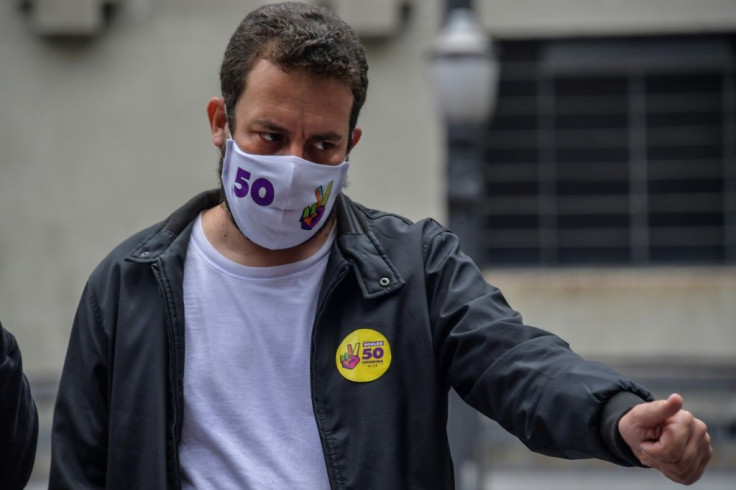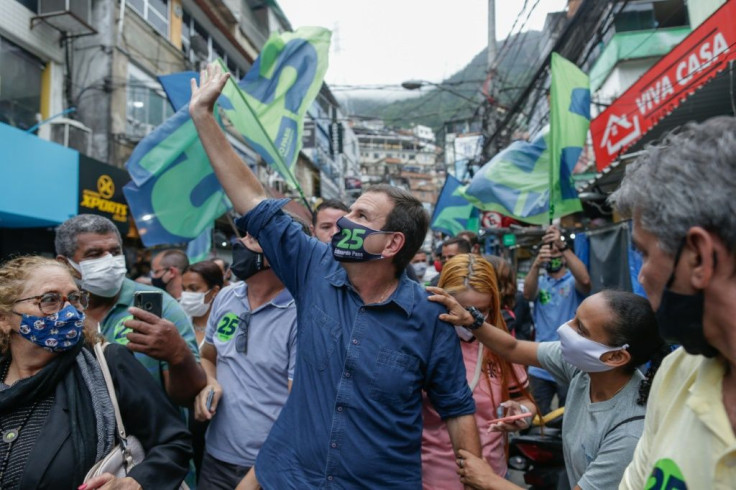Four Candidates Vie To Lead Brazil's Biggest Cities
A cancer survivor, a "rabble-rouser," an Evangelical pastor and "the happiest man in the world."
No, it's not the set-up for a joke: it's the cast of candidates running for mayor in Brazil's biggest cities, Sao Paulo and Rio de Janeiro, as the country holds municipal runoff elections Sunday tipped to give a preview of where Brazilian politics is headed two years before far-right President Jair Bolsonaro is up for reelection.

Bruno Covas, survivor:
The current mayor of Brazil's biggest city and economic capital, Covas, 40, was thrust into office when then-mayor Joao Doria stepped down in 2018 to run for governor of Sao Paulo state.
Covas, his previously low-profile deputy, soon got slammed with a nasty list of personal and professional crises: a cancer diagnosis, one of the world's worst coronavirus outbreaks in his city, and his own case of Covid-19 to boot.
Chemotherapy for the cancer in his upper stomach -- which spread to his liver and lymphatic system -- has made him lose his hair and grow thin.
But he has kept at his job. He even moved into city hall, installing a bed in his office when the pandemic led him to impose citywide stay-at-home measures.

The grandson of political heavyweight Mario Covas, a founder of the centrist Brazilian Social Democracy Party (PSDB) -- to which he belongs -- Covas has a powerful backer in his former boss, now-Governor Doria, a top contender to challenge Bolsonaro in 2022.
Guilherme Boulos, "radical rabble-rouser":
Opponents call him a "radical" and a "rabble-rouser." Admirers call him the new face of the Brazilian left.

Boulos, 38, is a leader of the Homeless Workers' Movement (MTST), a group known for organizing squatter invasions of abandoned buildings.
The charismatic young activist came from behind in the first round on November 15 to beat both Bolsonaro's candidate and a leftist rival from the more-established Workers' Party (PT) of ex-president Luiz Inacio Lula da Silva.
Progressives are now hoping Boulos and his upstart Socialism and Liberty Party (PSOL) can revive the Brazilian left, which has been battered by Lula's jailing on corruption charges and the 2016 impeachment of his successor, Dilma Rousseff -- the events that paved the way for Bolsonaro's rise.
First-round score: Covas 33 percent, Boulos 20 percent

Latest poll numbers: Covas 48 percent, Boulos 37 percent (Ibope)
Marcelo Crivella, "carnival killer":
Crivella, 63, Rio's current mayor, is an Evangelical bishop in one of Brazil's biggest mega-churches, the Universal Church of the Kingdom of God (IURD), which was founded by his uncle.
A Bolsonaro ally, he rode to victory in 2016 on a wave of outrage with the scandal-plagued left, but has proved to be an awkward fit for a city known for its beaches, nightlife and decadent carnival.
No sooner had he taken office than he committed the sin of snubbing "King Momo," the portly and jovial "ruler" of carnival, by failing to hand over the key to the city to him as tradition would have it.
Critics accuse Crivella of dodging the carnival festivities each year and trying to "kill" the legendary party by cutting its public funding.
His popularity has also suffered over his management of floods and landslides that regularly hit the city, and for allegations his church was used to launder embezzled money.
Eduardo Paes, "happiest man in the world":
Paes, 51, was Rio mayor from 2009 to 2016, presiding over both the 2014 World Cup and 2016 Olympics.
"I'm the happiest man in the world because I'm the mayor of Rio," he was fond of saying.
A carnival enthusiast who embraces Rio's laid-back style, he is the polar opposite of Crivella.
His administration was seen as a golden period for Rio, though there has been criticism in retrospect of unkept promises and white elephants left over from the World Cup and Olympics.
Still, Paes, who is running for the right-wing Democrats (DEM), looks set to win in a landslide over Crivella, who he says "doesn't understand this city."
First-round score: Paes 37 percent, Crivella 22 percent
Latest poll numbers: Paes 53 percent, Crivella 28 percent (Ibope)
© Copyright AFP 2024. All rights reserved.







